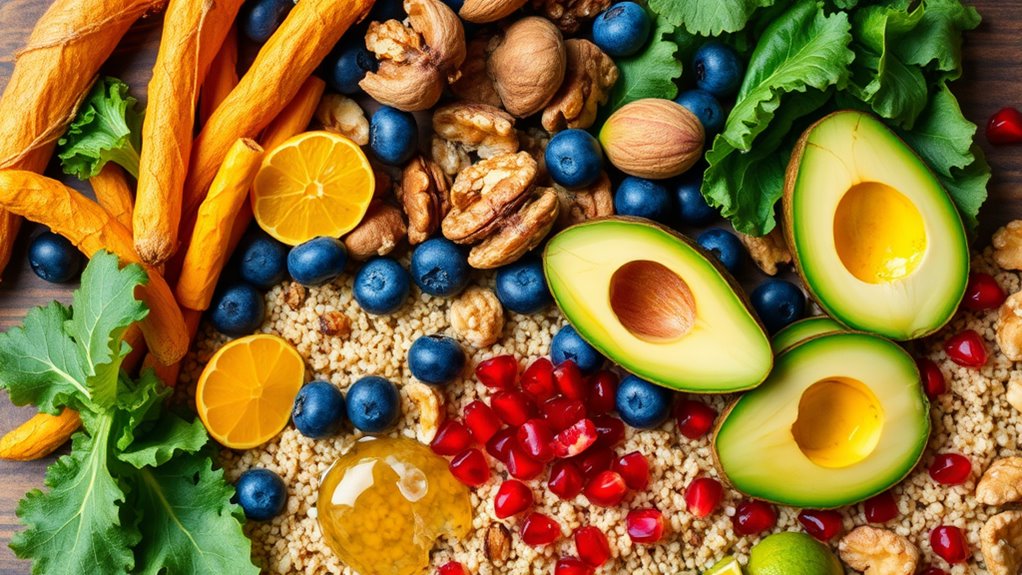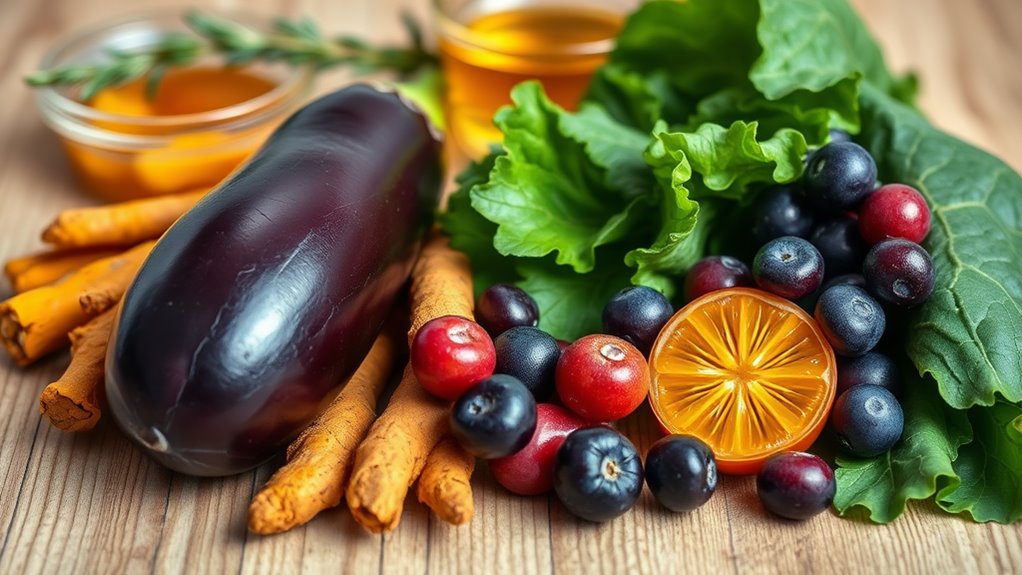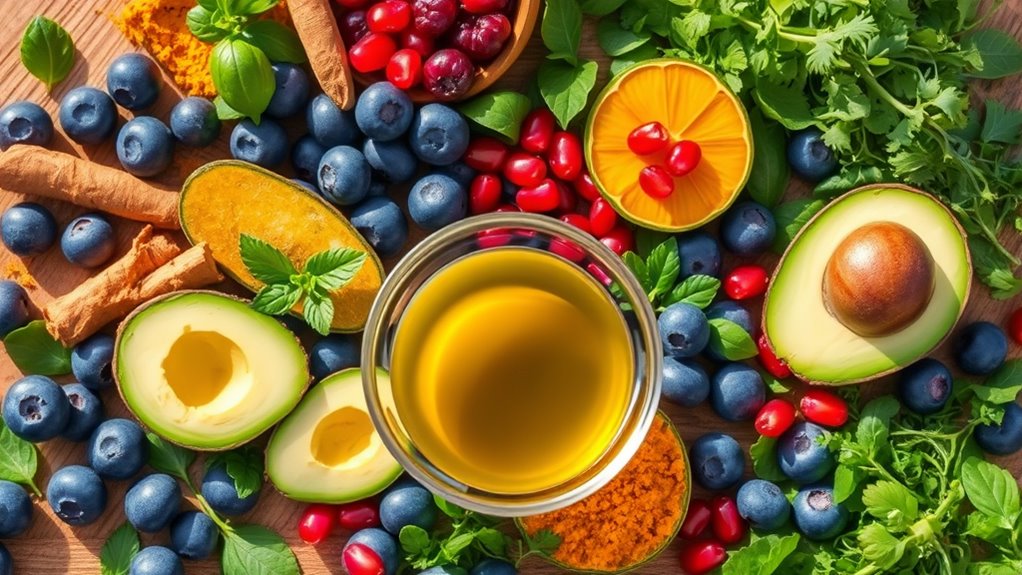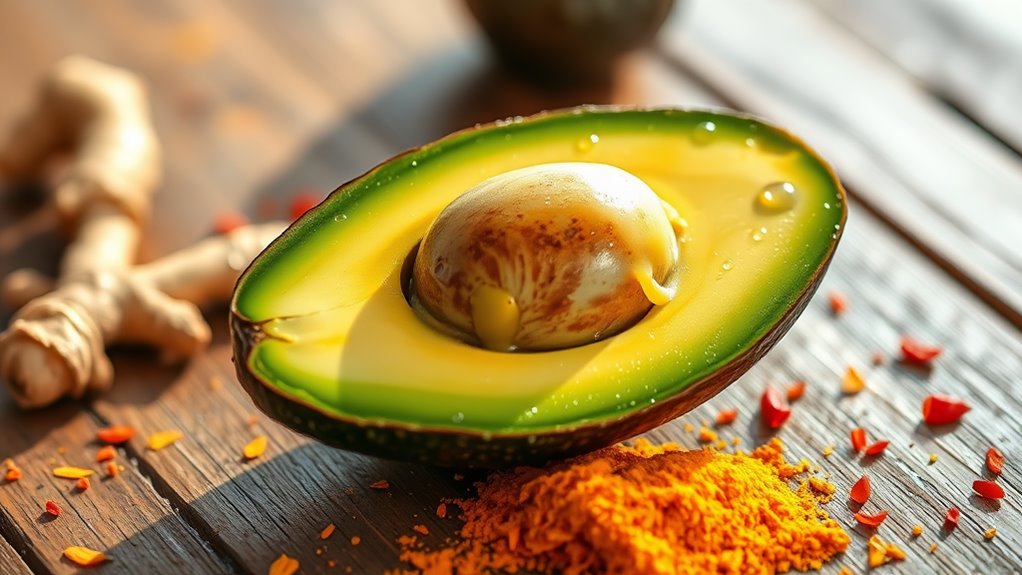15 Foods You Didn’t Know Fight Inflammation!
You’ll be surprised to find that everyday foods fight inflammation effectively. Enjoy berries and leafy greens for their powerful antioxidants. Don’t overlook fatty fish and avocado, which deliver healthy fats and omega-3s. Spices like turmeric and garlic add flavor while reducing inflammation, and pineapple contains bromelain for an extra boost. Green tea’s catechins work wonders too. Incorporating these foods can transform your meals. Stick around, and you’ll uncover even more hidden gems for your health.
Berries
Berries are tiny powerhouses packed with antioxidants that can help combat inflammation in your body. When you munch on blueberries, strawberries, or raspberries, you’re not just enjoying a sweet snack; you’re also boosting your health.
These fruits contain anthocyanins, which are compounds that give them their vibrant colors and have anti-inflammatory properties. Just a handful can support your immune system and reduce oxidative stress.
You can easily incorporate berries into your diet—add them to your morning yogurt, blend them into smoothies, or toss them in salads. By making berries a regular part of your meals, you’re choosing a delicious way to fight inflammation and promote overall well-being.
Fatty Fish
After enjoying a handful of berries, you might want to consider adding fatty fish to your diet for even more inflammation-fighting benefits.
Fatty fish like salmon, mackerel, and sardines are rich in omega-3 fatty acids, which have powerful anti-inflammatory properties. These healthy fats can help reduce joint pain, ease stiffness, and improve overall heart health.
Incorporating fatty fish into your meals just a couple of times a week can significantly boost your intake of these essential nutrients. Grilling, baking, or even making a tasty fish taco can make it easy to enjoy.
Turmeric
When it comes to fighting inflammation, turmeric stands out as a powerful ally. This vibrant yellow spice contains curcumin, a compound known for its strong anti-inflammatory properties. By incorporating turmeric into your meals, you can help reduce inflammation and improve overall health. You might sprinkle it in soups, mix it into smoothies, or use it to season roasted vegetables.
Not only does turmeric add flavor, but it also offers antioxidant benefits. To maximize its effects, pair turmeric with black pepper, which enhances curcumin absorption.
Whether you’re dealing with chronic pain or just looking to boost your wellness routine, adding turmeric could be a simple yet effective strategy. Make it a staple in your kitchen, and enjoy the benefits it brings!
Leafy Greens
Leafy greens are a powerhouse in the fight against inflammation. Packed with antioxidants, vitamins, and minerals, they help reduce oxidative stress and lower inflammation levels in your body.
Incorporating spinach, kale, Swiss chard, and collard greens into your meals can significantly boost your health. These greens are rich in vitamin K, which plays a crucial role in regulating inflammation.
Plus, their high fiber content supports gut health, further aiding in the inflammation battle. Try tossing them in salads, smoothies, or stir-fries to enjoy their benefits.
Avocado
In addition to leafy greens, avocados are another fantastic food that can help combat inflammation. Their creamy texture and rich flavor make them a versatile addition to your meals.
Packed with healthy fats, particularly monounsaturated fats, avocados support heart health and reduce inflammation markers in the body. They’re also loaded with antioxidants, including vitamin E and carotenoids, which fight oxidative stress.
Plus, avocados contain phytochemicals that have anti-inflammatory properties, making them an excellent choice for your diet. You can easily add them to salads, smoothies, or enjoy them on toast.
Olive Oil
While you might already know that olive oil is a staple in Mediterranean diets, its anti-inflammatory properties are equally impressive. Rich in monounsaturated fats and antioxidants, this golden liquid can help reduce inflammation in your body.
By incorporating olive oil into your meals, you’re not just enjoying flavor; you’re boosting your health.
Here are some benefits of olive oil:
- Contains oleocanthal, which has similar effects to ibuprofen
- Lowers the risk of chronic diseases like heart disease
- Enhances the absorption of nutrients from other foods
- Supports brain health and may reduce cognitive decline
- Helps maintain healthy skin and may combat aging
Mushrooms
After enjoying the benefits of olive oil, you might want to explore another powerful ally in the fight against inflammation: mushrooms.
These fungi are packed with antioxidants and anti-inflammatory compounds that can help reduce inflammation in your body. Varieties like shiitake, maitake, and reishi stand out for their immune-boosting properties. They contain polysaccharides, which support your immune system and combat inflammation.
Plus, mushrooms are low in calories and high in vitamins, making them a fantastic addition to any meal. You can toss them in stir-fries, add them to soups, or enjoy them grilled.
Nuts
Nuts aren’t just a tasty snack; they’re also a powerhouse in the fight against inflammation. Packed with healthy fats, antioxidants, and essential nutrients, they can help reduce inflammation and promote overall health.
Incorporating a variety of nuts into your diet can deliver impressive benefits.
Here are some nuts to consider:
-
Almonds: Rich in vitamin E and magnesium, which help combat oxidative stress.
-
Walnuts: High in omega-3 fatty acids, known for their anti-inflammatory properties.
-
Pistachios: Contain antioxidants that may lower inflammation markers.
-
Cashews: Offer copper and magnesium, essential for immune function.
-
Brazil nuts: Packed with selenium, supporting thyroid health and reducing inflammation.
Add these crunchy delights to your meals for a tasty health boost!
Dark Chocolate
Dark chocolate, particularly varieties with at least 70% cocoa, can be a delicious ally in the battle against inflammation.
Rich in antioxidants, it helps combat oxidative stress in your body, which is a major contributor to inflammation. When you indulge in dark chocolate, you’re not just treating your taste buds; you’re also enhancing your heart health.
The flavonoids found in dark chocolate improve blood circulation and may lower blood pressure. Plus, it stimulates the production of endorphins, boosting your mood.
Just remember to enjoy it in moderation to reap the benefits without overdoing the sugar.
Ginger
Ginger is a powerful spice that packs a punch when it comes to fighting inflammation. This ancient root isn’t just a flavorful addition to your dishes; it’s also loaded with health benefits.
You’ll find that incorporating ginger into your diet can help reduce inflammation and alleviate pain.
Here are some ways to enjoy ginger:
- Add fresh ginger to smoothies for a zesty kick.
- Brew ginger tea for a soothing, anti-inflammatory drink.
- Use ginger in stir-fries for a flavor boost and health benefits.
- Grate ginger into salad dressings for an extra zing.
- Sprinkle powdered ginger in baked goods for a warm spice.
Tomatoes
Tomatoes are a vibrant addition to any meal, and they come packed with anti-inflammatory properties that can benefit your health. Rich in lycopene, a powerful antioxidant, tomatoes help reduce inflammation and lower the risk of chronic diseases. You can easily incorporate them into salads, sauces, or as a side dish.
Here’s a quick breakdown of the benefits of tomatoes:
| Nutrient | Benefit | Source |
|---|---|---|
| Lycopene | Reduces inflammation | Fresh tomatoes |
| Vitamin C | Boosts immune function | Sun-dried tomatoes |
| Potassium | Regulates blood pressure | Tomato juice |
| Folate | Supports cell function | Canned tomatoes |
Adding tomatoes to your diet not only enhances flavor but also promotes overall well-being.
Pineapple
Pineapple is another delicious option that can help combat inflammation. This tropical fruit packs a powerful punch with bromelain, an enzyme known for its anti-inflammatory properties.
Incorporating pineapple into your diet can bring many benefits, making it not just tasty but also health-boosting.
Here are some great ways to enjoy pineapple:
– Add it to smoothies for a refreshing twist.
– Grill slices for a unique side dish.
– Toss it into salads for added sweetness.
– Use it as a topping on whole grain pizza.
– Blend it into salsas for a zesty kick.
Green Tea
Green tea is a powerful ally in the fight against inflammation. Packed with antioxidants, particularly catechins, it helps reduce oxidative stress in your body.
When you sip on a warm cup of green tea, you’re not just enjoying a comforting beverage; you’re also promoting healthier cells. Studies show that regular consumption can lower markers of inflammation and improve overall well-being.
You don’t need to drink gallons; even a couple of cups a day can make a difference. Plus, green tea’s unique compounds may enhance your metabolism, benefiting your health in more ways than one.
Beets
After enjoying a soothing cup of green tea, consider adding beets to your diet as another powerful food that fights inflammation.
Packed with antioxidants and essential nutrients, beets can help reduce inflammation and promote overall health. Their vibrant color comes from betalains, which are known for their anti-inflammatory properties.
To incorporate beets into your meals, try these ideas:
- Roast them for a sweet, caramelized flavor.
- Blend them into smoothies for a nutrient boost.
- Toss them in salads for added crunch and color.
- Cook them into soups for a hearty dish.
- Pickle them for a tangy snack.
With their versatility and benefits, you’ll find beets are a delicious way to support your body’s fight against inflammation.
Garlic
Although it may seem small, garlic packs a powerful punch when it comes to fighting inflammation. Rich in allicin, garlic’s active compound, it not only gives your meals a delicious flavor but also offers impressive health benefits.
This potent ingredient helps reduce markers of inflammation in your body, making it a great addition to your diet. You can easily incorporate garlic into your daily meals, whether you’re roasting it, adding it to stir-fries, or mixing it into dressings.
Not only does it enhance taste, but it also boosts your immune system and promotes heart health. So, the next time you cook, don’t forget to toss in some garlic—your body will thank you for it!
Frequently Asked Questions
Can Inflammation Be Caused by Certain Foods?
Yes, certain foods can trigger inflammation in your body. Processed sugars, trans fats, and refined carbohydrates often contribute to inflammatory responses. It’s important to be mindful of your diet to maintain overall health and reduce inflammation.
How Quickly Can Anti-Inflammatory Foods Show Effects?
Anti-inflammatory foods can show effects within days to weeks, depending on your body’s response. By incorporating these foods into your diet, you may notice reduced inflammation and improved well-being relatively quickly. Just stay consistent!
Are There Any Side Effects From Consuming These Foods?
While most anti-inflammatory foods are safe, you might experience mild digestive issues if you consume them in excess. Always listen to your body and consult a healthcare professional if you notice any adverse effects.
Can I Combine These Foods for Better Results?
You can definitely combine these foods for better results. Mixing them enhances their benefits, creating a powerful anti-inflammatory effect. Just pay attention to your body’s response and adjust combinations based on what feels best for you.
How Much of These Foods Should I Eat Daily?
To maximize benefits, aim for about two to three servings of each food daily. Balance is key, so mix them throughout your meals. Listen to your body, and adjust portions based on how you feel.





